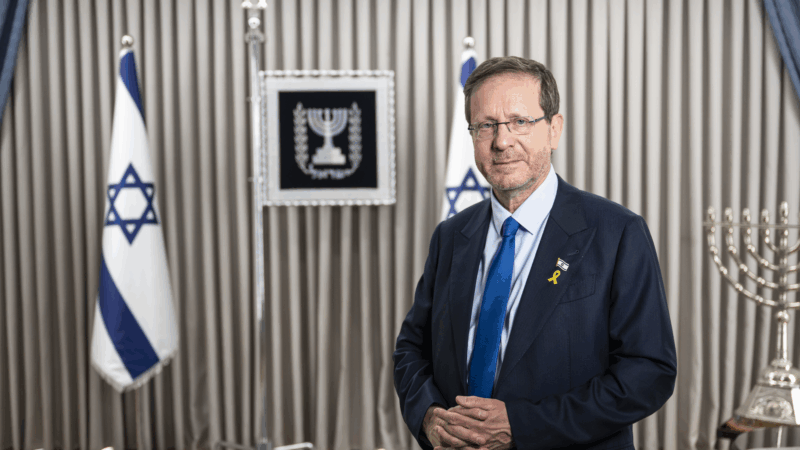Israeli president calls on the world to help destroy Iran nuclear sites
JERUSALEM — Israeli President Isaac Herzog told NPR that his country would welcome international support in its war to eradicate Iran’s nuclear program, which Israel says was on the threshold of building atomic weapons.
President Herzog — who holds a largely ceremonial role in Israel — spoke to NPR in his official residence in Jerusalem Wednesday, as President Trump was still weighing whether to intervene militarily in Iran. Trump is believed to be considering potentially authorizing B-2 bombers with bunker-busting bombs to take out Iran’s most heavily fortified nuclear sites.
Trump had earlier demanded an “unconditional surrender” from Iran, which he said meant: “I’ve had it. OK, I’ve had it. I give up. No more. Then we go blow up all the, you know, all the nuclear stuff that’s all over the place there.”
While Israel has not publicly called on the U.S. to join its offensive against Iran, Herzog said intervention from “nations” would certainly be welcomed.
“There’s a bigger picture here that the world and the American people should understand,” he said. It was just hours before Iran fired another missile barrage at Israel, which it has done repeatedly since Israel began attacking Iran last Friday.
“We have to stop this empire of evil — no more! — and tell them, get the goddamn nukes out of your hands. And start behaving in a decent way and not be the rogue state you are all over the world. It’s impossible,” Herzog said.
Iran has insisted its enrichment program is only for civilian purposes, though nuclear experts say it has enriched uranium to levels where it could be poised to break out and produce several warheads.
Israel shared intelligence with the U.S. before attacking Iran
Herzog said that Israel has been planning the attack on Iran for months, but the decision to carry it out was made only a few days ago, after Israel shared intelligence with the United States that Herzog said showed Iran’s plans to break out and produce a nuclear weapon.
“I don’t say that we got the approval from the United States, nor did we cooperate, but we’ve exposed to the Americans the hard intelligence and evidence that we have,” he said.
It was the first time an Israeli leader has spoken publicly about sharing such intelligence with the U.S. The Israeli president said the U.S. knew for days that Israel was considering a strike on Iran.
A person familiar with the matter told NPR on condition of anonymity because of the sensitivity of the subject that Israeli officials aren’t asking the U.S. to join the war but that they would be happy for their closest ally to actively participate, and believe the U.S. will in fact step in militarily.
That intervention could prove vital to Israel’s war aims: Only the U.S. military has the 30,000-pound bunker-busting bombs that could possibly penetrate the defenses of Iran’s Fordo nuclear site, built into the side of a mountain, and it is also only the U.S. that possesses the aircraft powerful enough to deliver them.
Israel says its airstrikes have established dominance of the skies over the Iranian capital of Tehran and the western part of the country, where the main nuclear facilities are located. Israel and the United Nations’ International Atomic Energy Agency assess that the attacks have severely damaged other sites, such as Natanz, but Fordo is the hardest to destroy.
The war could weaken Iran’s regime
Herzog also said that the war could weaken Iran’s regime so much that it may even fall. He said the government’s collapse could change the face of the region and, in his opinion, lead to an end of the war in Gaza, where Israel has been fighting Hamas since 2023, when the Iran-backed Palestinian militants launched a surprise attack on southern Israel.
However, some regional security analysts warn that a U.S. intervention could widen the conflict and provoke Iranian strikes on U.S. military bases in the Gulf, as well as oil infrastructure in the Gulf, which could send shockwaves through world markets.
Transcript:
JUANA SUMMERS, HOST:
Will the United States attack Iran’s nuclear facilities? President Trump said today he hasn’t made a decision, but he’s previously called for unconditional surrender. Israel has not publicly called on the U.S. to join its offensive against Iran. But today, in an interview with NPR, Israel’s President Isaac Herzog called for international support in destroying Iran’s main nuclear facilities. NPR’s Daniel Estrin is on the line from Israel. Hi, Daniel.
DANIEL ESTRIN, BYLINE: Hi, Juana.
SUMMERS: What is it like to meet with the president of a country that’s at war?
ESTRIN: President Herzog said he’s had some sleepless nights recently. We met in the president’s official residence in Jerusalem. The streets around the residence were very quiet because of all the missile fire from Iran in the last several days. Just about three hours after I met the president, Iran launched more missiles at Israel. Here’s what the air raid sirens sounded like.
(SOUNDBITE OF AIR RAID SIRENS)
ESTRIN: I should just say that the Israeli president plays a more ceremonial role as head of state. He did get a security briefing from Prime Minister Benjamin Netanyahu yesterday, and he does play a diplomatic role behind the scenes.
SUMMERS: What did he have to say about Israel’s behind-the-scenes conversations with the United States about Israel’s attack plans?
ESTRIN: He said Israel was planning this attack for a few months, but the decision to carry it out was taken a few days ago, and that was after Israel shared with the U.S. intelligence he said Israel has about Iranian plans to produce a nuclear weapon.
PRESIDENT ISAAC HERZOG: I don’t say that we got the approval from the United States, nor did we cooperate, but we’ve exposed to the Americans the hard intelligence and evidence that we have.
ESTRIN: He said the U.S. did know for days that Israel was considering a strike on Iran, but this is the first time an Israeli leader is speaking so specifically about Israel sharing such intelligence that they say they had with the U.S. Now, we should note the director of U.S. national intelligence testified in March that the U.S. intelligence community did not think Iran was building a nuclear weapon, but President Trump has dismissed that assessment.
SUMMERS: Now, what did the Israeli president say about the U.S. joining Israel in attacking Iran?
ESTRIN: I asked the Israeli president about that several times. I asked whether Israel would welcome U.S. involvement in Iran. He was very careful not to give a direct answer, but he said the – he respects the president of the United States, and he said, quote, “we’ll just have to wait and see.” He tried to make the case that Israel’s campaign to destroy Iran’s nuclear weapons capabilities was in the interest of the world and the U.S.
HERZOG: There’s a bigger picture here that the world and the American people should understand. We have to stop this empire of evil – no more. And tell them, get the g****** nukes out of your hands and start behaving in a decent way and not be the rogue state you are all over the world. It’s impossible.
ESTRIN: I want to add that I spoke with a person familiar with the matter, speaking on condition of anonymity because of the sensitivity of the issue, who told me Israeli officials are not asking the U.S. to join in the attack on Iran, but Israeli officials would be happy for the U.S. to actively participate and think the U.S. will indeed take part with Israel in bombing Iran.
SUMMERS: Daniel, would Israel need the U.S. to actually achieve its goal of destroying Iran’s nuclear sites?
ESTRIN: The president of Israel would not answer that question directly, but here’s what he did say.
HERZOG: We are doing it alone, and we hope that there will be further support by other nations.
ESTRIN: And about support by other nations, you know, military experts say Israel does not have the bunker-busting bombs nor the warplanes to pierce through Iran’s most fortified nuclear facility, Fordow. The U.S. does have that capability, and so that’s why the question of U.S. involvement is crucial.
SUMMERS: That’s NPR’s Daniel Estrin, who met with Israel’s president today in Jerusalem. Daniel, thank you so much.
ESTRIN: You’re welcome.
Team USA faces tough Canadian squad in Olympic gold medal hockey game
In the first Olympics with stars of the NHL competing in over a decade, a talent-packed Team USA faces a tough test against Canada.
PHOTOS: Your car has a lot to say about who you are
Photographer Martin Roemer visited 22 countries — from the U.S. to Senegal to India — to show how our identities are connected to our mode of transportation.
Looking for life purpose? Start with building social ties
Research shows that having a sense of purpose can lower stress levels and boost our mental health. Finding meaning may not have to be an ambitious project.
Sunday Puzzle: TransformeR
NPR's Ayesha Rascoe plays the puzzle with listener Joan Suits and Weekend Edition Puzzlemaster Will Shortz.
Danish military evacuates US submariner who needed urgent medical care off Greenland
Denmark's military says its arctic command forces evacuated a crew member of a U.S. submarine off the coast of Greenland for urgent medical treatment.
Only a fraction of House seats are competitive. Redistricting is driving that lower
Primary voters in a small number of districts play an outsized role in deciding who wins Congress. The Trump-initiated mid-decade redistricting is driving that number of competitive seats even lower.






